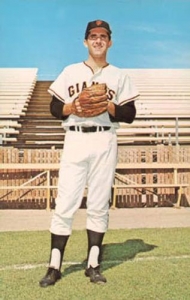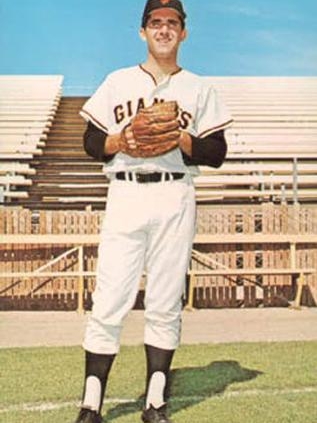June 12, 1959: Mike McCormick yields single in sixth, settles for rain-shortened no-hitter
 The Philadelphia Phillies were finally mounting a rally against Mike McCormick and the San Francisco Giants. Trailing 4-0, they had the bases loaded with no outs in the bottom of the sixth with the heart of their order due to bat. Then the rain came. It was a “torrential downpour,” accompanied by thunder and lightning, declared Giants beat writer Walter Judge, “almost like a typhoon.”1 After 40 minutes the infield “tarpaulin look[ed] like a lake,” he noted, and the umpires called the game. According to baseball rules, the score reverted back to the end of the fifth inning and all statistics accrued since then were erased. The result was “a freakish – but unofficial – no-hit game,” opined the San Francisco Examiner.2 “I was lucky,” quipped McCormick. “I’ll take it.”3
The Philadelphia Phillies were finally mounting a rally against Mike McCormick and the San Francisco Giants. Trailing 4-0, they had the bases loaded with no outs in the bottom of the sixth with the heart of their order due to bat. Then the rain came. It was a “torrential downpour,” accompanied by thunder and lightning, declared Giants beat writer Walter Judge, “almost like a typhoon.”1 After 40 minutes the infield “tarpaulin look[ed] like a lake,” he noted, and the umpires called the game. According to baseball rules, the score reverted back to the end of the fifth inning and all statistics accrued since then were erased. The result was “a freakish – but unofficial – no-hit game,” opined the San Francisco Examiner.2 “I was lucky,” quipped McCormick. “I’ll take it.”3
Skipper Bill Rigney’s Giants were in the City of Brotherly Love, their fourth and final stop of a 16-game road swing, during which they had split their first 12 contests. With a record of 32-25, they were in second place, just two games behind the Milwaukee Braves. Manager Eddie Sawyer’s Phillies had the worst record (21-33) among the 16 big-league teams and were headed to their second of four consecutive last-place finishes.
Toeing the rubber for the Giants was McCormick, a 20-year-old, highly touted southpaw, who debuted as a 17-year-old in 1956. Still a teenager, he emerged as a sturdy starter-reliever in 1958, posting an 11-8 slate and logging 178⅓ innings. In his only other start against the Phillies in 1959, he flirted with a no-hitter for 7⅓ frames and settled for a three-hit shutout on May 14 at Seals Stadium. “I’ve been having some troubles lately,” said the hurler, looking forward to ending a slump (15 runs in 11⅓ innings in his last three appearances) against the low-scoring Phillies.4 Scheduled to be his mound opponent was Ruben Gomez, the former Giant acquired by the Phillies in the offseason, but the Puerto Rican native came down with a sore throat, reported sportswriter Allen Lewis of the Philadelphia Inquirer, and was scratched.5 He was replaced by Jack Meyer, a 27-year-old right-hander, who had made 170 appearances thus far in his five-year big-league career, all but 19 of them in relief.
Rigney was forced to rearrange his outfield with perennial All-Star Willie Mays suffering from a bruised hip. Felipe Alou took over center field, Willie Kirkland occupied the right corner, and Jackie Brandt the left one. He also benched acclaimed shortstop prospect Andre Rodgers, who had committed seven errors in his previous seven games, and inserted Eddie Bressoud.
A robust crowd of 20,595 turned out at Connie Mack Stadium on a warm Friday evening despite the threat of precipitation. Jim Davenport led off with a thunderous line drive off the screen on the lower deck in left field. In a valiant attempt to catch the ball, Harry Anderson “tried to scale the boards to make the catch, failed and fell,” reported sportswriter Lewis.6 With Davenport on third with a triple, Kirkland sent a routine one-out grounder to first, but it dribbled through Ed Bouchee’s legs for an error as Davenport scored. (Kirkland was credited with an RBI.) Orlando Cepeda, who entered the game with the NL’s fourth-highest batting average (.336), singled sending Kirkland to third where he was called out by veteran umpire Jocko Conlan. An irate Rigney challenged the call vehemently, and after “lots of arm-waving, dirt-kicking and nose-to-nose jawing,” noted Walter Judge, was tossed from the game.7
McCormick was on cruise control, baffling the listless Phillies with a combination of fastballs, curves, and changeups.8 He set down the first 10 batters he faced before issuing a one-out walk in the fourth to Gene Freese on a 3-and-2 count.
After holding the Giants hitless since Cepeda’s single, Meyer yielded a leadoff double to Bressoud in the fifth. Hobie Landrith then walloped Meyer’s first pitch over the right-field fence to give the Giants a 3-0 lead. Davenport laced a one-out single, but was left stranded.
Meyer was back on the mound, following McCormick’s one-two-three fifth. Brandt spanked a “dynamic double” off the scoreboard in center to drive in the Giants’ fourth run.9
Having retired 15 of 16 batters, McCormick began the sixth by issuing consecutive leadoff walks to Valmy Thomas and Jim Bolger, pinch-hitting for Meyer. Richie Ashburn, who entered the game batting just .258 after capturing his second NL batting title in ’58 with a .350 average, sent McCormick’s first pitch into center field for the Phillies’ first hit of the game. The bases were loaded.
McCormick had worked the count to 1-and-2 on Freese when the rain came down, forcing umpires to halt play at 9:45 P.M. Judge wrote that it “appeared to be another quickie” like in the third inning when play was suspended for four or five minutes.10 But the downpour didn’t let up. And after 40 minutes, the umpires called the game. It was declared a 3-0, five-inning victory for the Giants, with an official game time of 1 hour and 35 minutes. It was a “rough break” for the Phillies, lamented Lewis, who added that “little had gone right for them tonight.”11
McCormick was credited with an unofficial five-inning no-hitter. (Official no-hitters must be complete regulation games of at least nine innings.) He lost his next two starts, but got back on track again against the Phillies, shutting them out on three hits on June 26 in San Francisco. He finished the season with a 12-16 record (3.99 ERA) and surpassed the 200-innings-pitched mark for the first time of five times in his career. An emerging star, McCormick led the NL with a 2.70 ERA in ’60, and as SABR member Warren Corbett noted in the player’s bio in the BioProject, the left-hander had amassed almost 1,000 innings (970⅓) pitched before his 23rd birthday, a figure only Bob Feller had surpassed in the Live Ball (post-1920) Era. McCormick developed shoulder problems in 1962. He missed large chunks of four seasons (1962-1965) and his career was in jeopardy. He reinvented himself, relying more on breaking balls and off-speed stuff instead of his onetime fastball, and surfaced as one of baseball’s feel-good stories in 1967, winning an NL-most 22 games and the Cy Young Award. He finished his 16-year big-league career (1956-1971) with a 134-28 slate and logged 2,380⅓ innings, but never seriously flirted with a no-hitter again in his career after his rain-shortened gem.12
SOURCES
In addition to the sources cited in the Notes, the author accessed Retrosheet.org, Baseball-Reference.com, Newspapers.com, and SABR.org.
NOTES
1 Walter Judge, “Rain Gives Mike McCormick ‘No-Hit’ Win,” San Francisco Examiner, June 13, 1959: 21.
2 Judge.
3 George Esper (Associated Press), “‘I Was Lucky, but I’ll Take It’ – Mike,” San Francisco Examiner, June 13, 1959: 21.
4 Esper.
5 Allen Lewis, “Hitless Phils Lose, 3-0, to Giants in 5,” Philadelphia Inquirer, June 13, 1959: 19.
6 Lewis.
7 Judge.
8 Esper.
9 Judge.
10 Judge. Neither the Philadelphia or San Francisco papers mentioned who scored; however, it was either Cepeda or Daryl Spencer.
11 Lewis.
12 Defined as carrying a no-hitter into the eighth inning or later.
Additional Stats
San Francisco Giants 3
Philadelphia Phillies 0
5 innings
Connie Mack Stadium
Philadelphia, PA
Box Score + PBP:
Corrections? Additions?
If you can help us improve this game story, contact us.


